Search Thermo Fisher Scientific
Invitrogen
TNFAIP3 Recombinant Rabbit Monoclonal Antibody (SN07-31)
FIGURE: 1 / 7
TNFAIP3 Antibody (MA5-32292) in ICC/IF
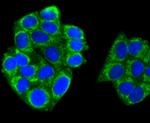
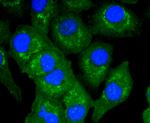
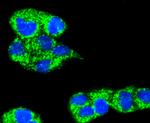
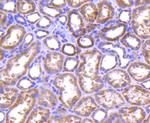
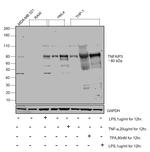
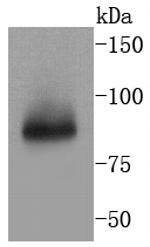
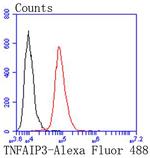
Product Details
MA5-32292
Species Reactivity
Host/Isotype
Expression System
Class
Type
Clone
Immunogen
Conjugate
Form
Concentration
Purification
Storage buffer
Contains
Storage conditions
Shipping conditions
RRID
Product Specific Information
Recombinant rabbit monoclonal antibodies are produced using in vitro expression systems. The expression systems are developed by cloning in the specific antibody DNA sequences from immunoreactive rabbits. Then, individual clones are screened to select the best candidates for production. The advantages of using recombinant rabbit monoclonal antibodies include: better specificity and sensitivity, lot-to-lot consistency, animal origin-free formulations, and broader immunoreactivity to diverse targets due to larger rabbit immune repertoire.
Target Information
TNFAIP3, also known as A20, is located in chromosome band 6q23, a region that is often deleted in B cell lymphomas. Recently, it was identified as a tumor suppressor gene in Hodgkin lymphoma and several subtypes of non-Hodgkin lymphomas. TNFAIP3 was initially identified as a zinc-finger protein that is rapidly and transiently induced by TNF-a, inhibiting NF-kappa-B-dependent gene expression, and protecting cells from TNF-a-cytotoxicity. Overexpression of TNFAIP3 also inhibits the TLR2- and TLR4-mediated interleukin-8 synthesis in airway epithelial cells, suggesting that TNFAIP3 also acts as a negative regulator of TLR-mediated inflammatory responses, thereby protecting the host against harmful over-responses to pathogens. At least two isoforms of TNFAIP3 are known to exist.
For Research Use Only. Not for use in diagnostic procedures. Not for resale without express authorization.
References (0)
Bioinformatics
Protein Aliases: OTU domain-containing protein 7C; Putative DNA-binding protein A20; RP11-356I2.3; TNF alpha-induced protein 3; TNFAIP3 (A20); Tumor necrosis factor alpha-induced protein 3; tumor necrosis factor induced protein 3; tumor necrosis factor inducible protein A20; tumor necrosis factor, alpha induced protein 3; tumor necrosis factor, alpha-induced protein 3; Zinc finger protein A20
Gene Aliases: A20; AISBL; OTUD7C; TNFA1P2; TNFAIP3; Tnfip3
UniProt ID: (Human) P21580, (Mouse) Q60769
Entrez Gene ID: (Human) 7128, (Mouse) 21929

Performance Guarantee
If an Invitrogen™ antibody doesn't perform as described on our website or datasheet,we'll replace the product at no cost to you, or provide you with a credit for a future purchase.*
Learn more
We're here to help
Get expert recommendations for common problems or connect directly with an on staff expert for technical assistance related to applications, equipment and general product use.
Contact tech support
